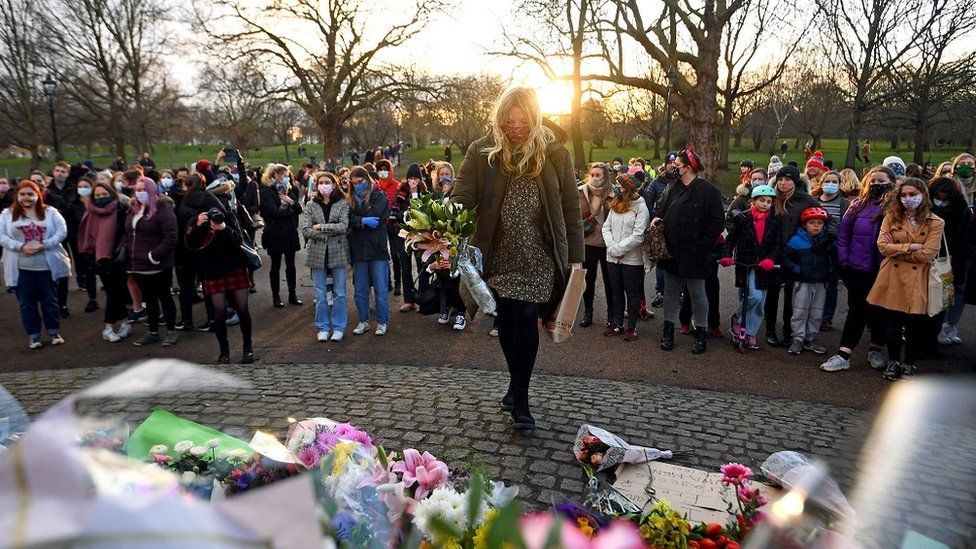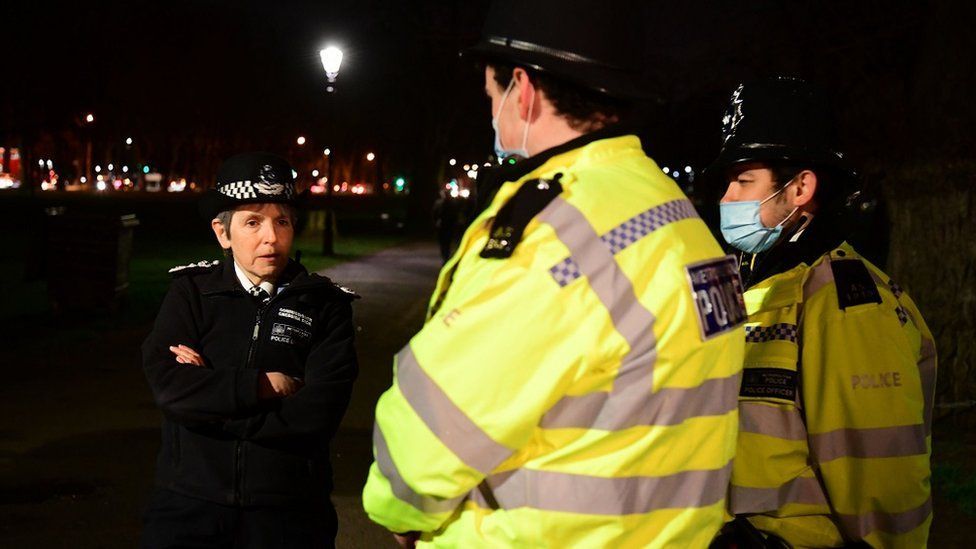
Sarah Everard: What went wrong at the Clapham vigil?
But when it goes wrong, then the inevitable accusations of failure come piling in.
Sunday dawned badly for the Metropolitan Police's commissioner, Dame Cressida Dick. Her officers were accused of oppressing women and politicians waded in calling for her head.
But the seeds for Saturday's PR disaster for the force were sown in the legal dispute over whether a vigil could take place at all - and how events then seemed to run out of control.
The question is whether the police should have foreseen that happening. That, time and again, is the great challenge of public order policing.
Earlier in the week it became increasingly clear that people up and down the UK wanted to hold vigils for Sarah Everard.
Women in London, organising under the Reclaim These Streets banner, approached Met commanders for their help in setting up a vigil on Clapham Common in south London, close to where Ms Everard was last seen alive.
The police said a demo would be illegal under the coronavirus lockdown regulations.
And so the women and their lawyers asked the High Court to make a declaration that would force the police to think again.
The problem is that the law is not that clear cut.
For almost a year, the ambiguities and omissions within the coronavirus restrictions have left both the police and the public grasping for answers as to what is possible in public. It's so complex we've even seen people fined for walking while holding a cup of tea.
'Reasonable excuses'

Gatherings in public are generally banned in England but, at the same time, the rules recognise there are "reasonable excuses" to be outside.
But the law doesn't specify whether a demonstration on a major issue of public importance - such as this vigil - is one of those excuses.
No matter what the Covid regulations say, there is an overarching right to freedom of expression that is enshrined in the Human Rights Act. That means the police have a legal duty to help make safe protests possible.
But that right is not an absolute trump card - it can be interfered with if the police can show they have good reason to stop an event happening.
And after hours of difficult legal argument on Friday, the judge refused to intervene and basically told the two sides to work it out for themselves with all those legal principles in mind.
In the absence of further legal clarity, the organisers claimed victory. They said the police had to now negotiate a sensible well-run vigil.
Push back
Then, the police pushed back hard. They said they too had been vindicated. They could not authorise a potentially unlimited demonstration that would become an enormous Covid-spreading event. Stay at home, they said.
By Saturday morning, the organisers abandoned their plans amid a very serious risk they could each face a £10,000 fine for organising a lockdown-breaking gathering.
But by that point, it was inevitable that people would turn up at Clapham Common, whether or not there was going to be a public event. It was the talk of social media.
So given that racing certainty, and the lack of official marshals that Reclaim These Streets said they would have provided had the police agreed to a vigil, what was the police's plan to keep people safe?
Tactics

The turning point in Scotland Yard's tactics appears to have been the start of speeches from the bandstand, around 18:00 GMT. People pressed forwards to hear.
Assistant Commissioner Helen Ball said: "At this point, officers on the ground were faced with a very difficult decision.
"Hundreds of people were packed tightly together, posing a very real risk of easily transmitting Covid-19."
And so, they tried to break up that part of the gathering and remove people whom they believed were contributing to the crowding.
Patsy Stevenson, the red-haired woman caught on camera being handcuffed on the ground at the bandstand, received a £200 Covid fine as police tried to remove her from the area.
She has not been accused of, or charged with, violence - but was there any elsewhere?
There was definitely a lot of anger - with some of the crowd chanting obscenities at the police at one point.
The Metropolitan Police Federation, representing frontline officers, says 26 of them were assaulted yesterday at Clapham - punched, kicked and spat at.
Pictures obtained by the Press Association clearly show three instances of officers being forcibly pushed and a van's wing mirror being deliberately vandalised. Guess what? All three instances involved men, not women.
Unanswered questions

Police forces elsewhere in the UK were waiting for a lead from the Met. But those that saw DIY vigils - albeit far smaller ones - appeared to take a stand-back approach.
The better comparison is Black Lives Matter last summer, when there were large crowds in London and elsewhere that were clearly not socially distancing.
Why the difference? That, and other questions about how the operation unfolded, may have been answered in the report that's been sent to Home Secretary Priti Patel.
She's now asked Her Majesty's Inspectorate of Constabulary to carry out its own external review of the event - and what Ms Patel ultimately concludes may dictate whether Dame Cressida survives calls for her to go.
While the commissioner is accountable to the Mayor of London, who has raised his own serious concerns after a meeting with Dame Cressida, the Home Secretary is jointly responsible for deciding who gets the job - and when they should go.
Dame Cressida is highly respected both in policing and government - far more so than some of her predecessors - but she remains a controversial figure for many others.
She commanded the 2005 operation that led to the shooting dead of Jean Charles De Menezes, after he was mistaken for a suicide bomber - although a jury exonerated her of any personal wrongdoing.
More recently, she called for better powers to deal with Extinction Rebellion's repeated occupations of parts of London. The government agreed - and the home secretary's proposals to greatly expand the police's ability to curtail demonstrations goes before Parliament on Monday.
Ask most police officers who have experience of covering public protests, and they will tell you they often feel - individual mistakes besides - it is a no-win situation when things go wrong. (Just last week I was talking about this very dilemma on BBC Newscast.)
It would be something of a terrible twist of fate for the commissioner - the first woman in the post - to lose her job in these circumstances.











